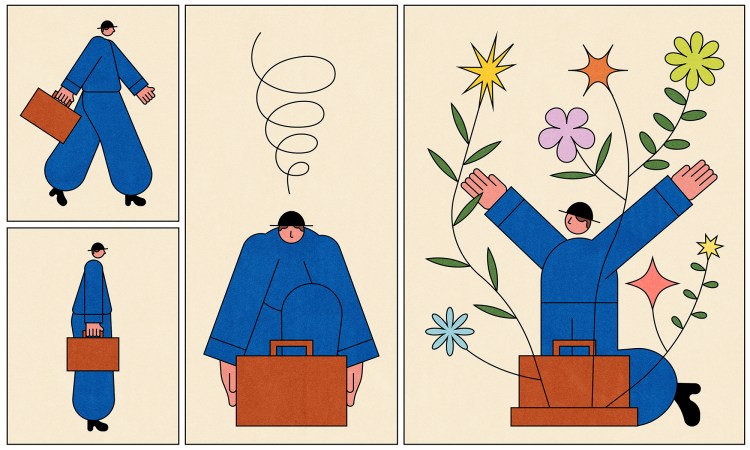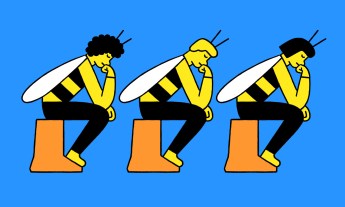
This post is part of TED’s “How to Be a Better Human” series, each of which contains a piece of helpful advice from people in the TED community; browse through all the posts here.
Today, so many of us are wishing to safeguard ourselves — and our careers — against uncertainty. But how do we do this in a world where the waves of change keep coming and it can take all our energy just to stay afloat?
By thinking long term, says Dorie Clark, consultant and keynote speaker. “Long-term thinking protects us during downturns (of all kinds), because it keeps us moving toward our most important goals … It’s the surest path to meaningful and lasting success in a world that so often prioritizes what’s easy, quick, and ultimately shallow,” writes Clark in her new book The Long Game.
If we want to play the long game, one of the first things we must do is identify those goals so we’re able to make the adjustments needed in our lives to move towards achieving them. In this excerpt, she shares some strategies to assist people in pinpointing their goals.
I get messages from people all the time — from recent grads to senior professionals — who are struggling with finding their “true passion,” or their “real purpose,” or what they’re “meant to do.”
They believe that each of us has a calling, and it’s our responsibility to find it.
The whole premise of playing the long game is we’re not victims of circumstance. Our current reality isn’t our fixed, eternal reality.
But what should you do if you’re still figuring out what feels meaningful to you or if you’re drawn to many different things? In these situations, I’ve found it can helpful for you to optimize for interesting. Let me explain what I mean.
Sixteen years ago, I met Marion Stoddart. She was nearly 80, with short white hair, a lined face and a kayak. In the 1960s, she’d led a successful cleanup of the Nashua River in Massachusetts, which was, at the time, one of the ten most polluted rivers in the US. I ended up directing a documentary film about her life, and to make it, our team spent hours interviewing Marion. One of her stories stands out in my mind.
When Marion was 17 and leaving home for college, her mother gave her one last piece of advice. “Whenever you have a choice of what to do,” she told Marion, “choose the more interesting path.”
Wherever we are in our lives, we may not know what exactly we want to do or what we’re good at. However, we all have things we’re interested in. But what should you do if they don’t seem “meaningful” enough to be a career? Let’s take a passion for photographing birds. Well, if it’s interesting for us, following that curiosity could spur us towards mastery and send us in useful directions — like new connections, a book project or a campaign to preserve local wetlands.
Some may question this advice of optimizing for interesting, that it’s a pipe dream or something only the wealthy can do. That’s fair enough — in the short term. But the whole premise of playing the long game is we’re not victims of circumstance. Our current reality isn’t our fixed, eternal reality.
But what if you’ve been working heads down for so long that you’re not even sure what you find interesting anymore? Or you’re stuck or bored in your professional life, or feel confused, or just aren’t sure where to start?
Here are three ways to optimize for interesting in your own life:
1. Evaluate how you’re spending your time
Often, the truest test of what’s interesting to you is to look at how you’re spending time right now.
For instance, if you can’t get enough of podcasts and are always recommending new ones to others, maybe you could raise your hand and offer to launch one for your company or seek a job working for a firm that produces them.
Or if your Instagram feed is littered with close-ups of food, you might be a good candidate to become a food writer, start a catering company or head up branding for a food company.
It’s valuable to notice what is holding your attention — but don’t rush to make a fascination your new mission until you’ve tested it out. Find ways to learn more, such as setting up interviews with people who work in the field, reading books about it or asking a friend if you can shadow him at work for a day. By seeing if your curiosity sustains itself over time, you can weed out fleeting interests.
2. Remember what got you started
“I’m an artist,” Sarah Feingold told me, “and I went to law school because I wanted to help artists like myself.”
But it didn’t turn out that way. She got a job at a small law firm in upstate New York. She drafted motions, drew up contracts and worked on real estate deals. Even though she was learning a lot, she didn’t feel satisfied.
What did bring her joy was making jewelry on the side, which she started selling on a then-new website called Etsy. Looking at the site, she had a revelation: “Etsy didn’t have an in-house attorney, and my goal to help artists could come true if I worked for them.”
When you’re unsure of where your interests lie, go back to your first principles.
One day, Etsy announced new policies. Sarah had questions and some legal insights. Since the company was still small, she got the CEO, Rob Kalin, on the phone. They had a short chat, and then Sarah decided to press her luck.
She booked a plane ticket to NYC to pitch him for a job, but Kalin said he was busy. She persisted, and eventually he agreed to fit her in. When they met, he ended up hiring her on the spot.
“At the time, people thought what I did was ridiculous,” recalls Sarah, who went on to work at Etsy for over nine years. Why give up a steady job? But safety and security weren’t what brought her to law; she’d studied it to help other artists. That’s what was interesting to her, and she was willing to fight for it.
When you’re unsure of where your interests lie, go back to your first principles.
3. Ask: What kind of person do you want to be?
Here’s another great question to ask as you’re figuring out which interests to pursue: What kind of person do you want to be?
For my friend Alisa Cohn, an executive coach, it all started with Hamilton. She was obsessed with the musical by Lin-Manuel Miranda and saw it eight times. One day she learned about another of Miranda’s creations: Freestyle Love Supreme Academy, a course that teaches beatbox improv rap. “Without knowing much about it,” Alisa recalls, “I said, ‘Sign me up.’”
When she finally got accepted, she kept deferring, because the timing was never right. But it wasn’t just the schedule. Her fears rattled around: “I’m going to look stupid, I’m not going to do well, I can’t do this, everyone’s going to laugh at me. I’m sure I had childhood flashbacks of being bullied or laughed at as a kid.”
She forced herself to go to the first day of class. There, she realized she was an outlier. “Half of the group had some, or even a lot, of experience,” she says. “And I had literally zero experience. Most of them at least had an affinity for rap, which I totally didn’t. I had learned rap from Hamilton.”
Too often, in our lives, we tend to look at where we are right now and say, “Where can I go from here?” But that’s asking the wrong question.
That night, she spent three hours “realizing I’m not very good at this.” Then it was time for the evening’s finale, where everyone stood in a circle and rapped when it was their turn. She recalls, “I literally couldn’t do it. I was so self-conscious.”
But then it hit her: “Part of my inspiration and my desire [to take the course] was overcoming my self-consciousness. I have creativity inside of me, and I want to unleash it. And I knew that this would help.”
Eight weeks later, she performed her own freestyle improv rap onstage as part of their graduation showcase. “I’m not saying I was good, because I wasn’t that good,” she says. “But I was good enough, and I got through it and everyone was very supportive.”
Since then, Alisa has kept up her efforts. She hired a friend to write a rap about her work as an executive coach for startups, and she recorded it and filmed a video on her phone.
Now Alisa isn’t intending to become a rap star, but to her, the experience is about something bigger: “I think it is going to continue to lead me down the path of more creativity and being more unleashed, more unfettered, and less self-conscious.”
There are a million reasons not to try something new. But playing the long game means acknowledging we aren’t already experts at everything, and that it’s OK to sometimes look foolish in service of becoming the person we want to be.
Too often, in our lives, we tend to look at where we are right now and say, “Where can I go from here?” But that’s asking the wrong question. If you start with your present situation, you’re limiting yourself out of the gate to what seems attainable.
When we make the choice to optimize for interesting, we’re investing in our future selves. We don’t know where it will lead, and that’s the whole point.
Playing the long game means preparing ourselves for an uncertain future, where, because of the effort we’ve invested over time, we’re ready to take full advantage of the opportunities life presents.
Excerpted with permission from the new book The Long Game: How to Be a Long-Term Thinker in a Short-Term World by Dorie Clark. Published by Harvard Business Review Press. Copyright © 2021 Dorie Clark. All rights reserved.
Watch her TEDxBoston Talk now:












